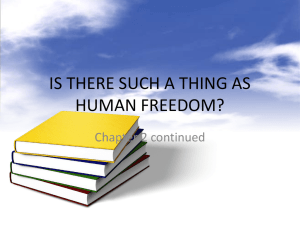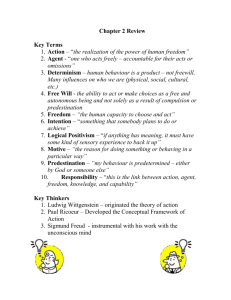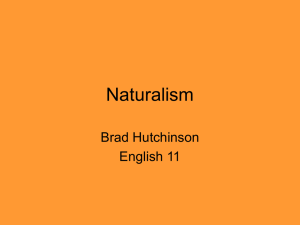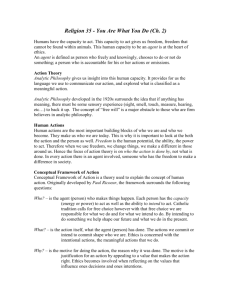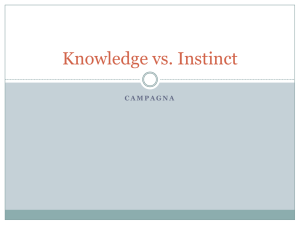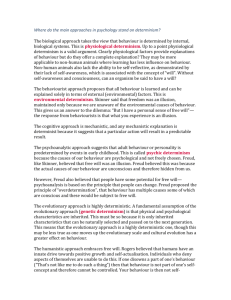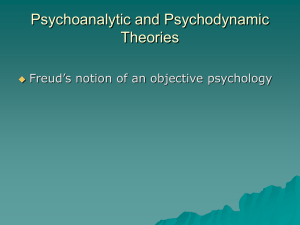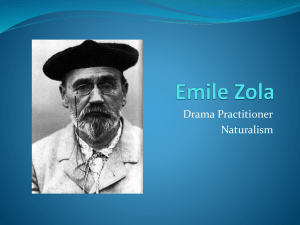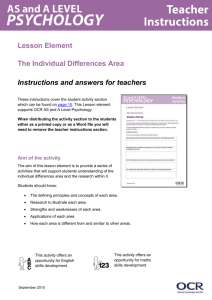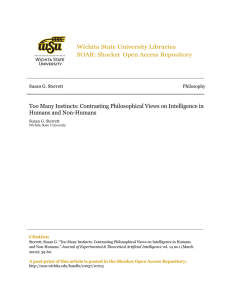Chapter 2 Summary Definitions Action
advertisement
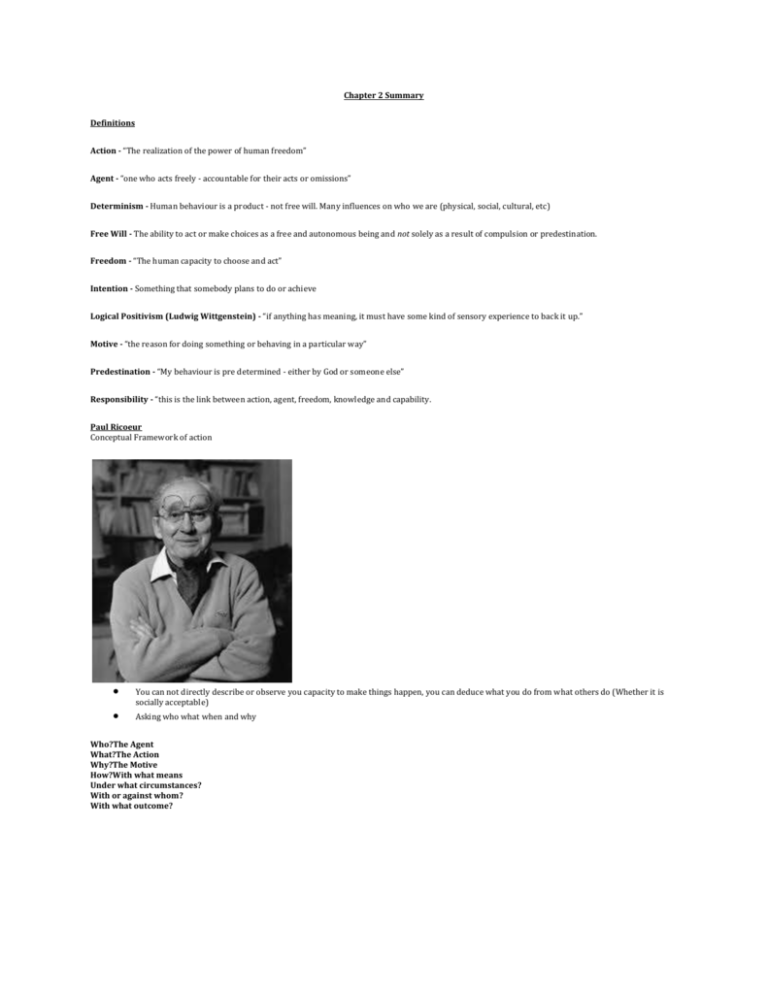
Chapter 2 Summary Definitions Action - “The realization of the power of human freedom” Agent - “one who acts freely - accountable for their acts or omissions” Determinism - Human behaviour is a product - not free will. Many influences on who we are (physical, social, cultural, etc) Free Will - The ability to act or make choices as a free and autonomous being and not solely as a result of compulsion or predestination. Freedom - “The human capacity to choose and act” Intention - Something that somebody plans to do or achieve Logical Positivism (Ludwig Wittgenstein) - “if anything has meaning, it must have some kind of sensory experience to back it up.” Motive - “the reason for doing something or behaving in a particular way” Predestination - “My behaviour is pre determined - either by God or someone else” Responsibility - “this is the link between action, agent, freedom, knowledge and capability. Paul Ricoeur Conceptual Framework of action You can not directly describe or observe you capacity to make things happen, you can deduce what you do from what others do (Whether it is socially acceptable) Asking who what when and why Who?The Agent What?The Action Why?The Motive How?With what means Under what circumstances? With or against whom? With what outcome? Mind-Brain Distinction Rene Descaretes (1596 - 1650) “I think therefore I am” First to argue that a distinction exists between the mind and the brain. He realized that he could doubt everything including his own existence. The only thing he was certain about was his own doubt. The fact that there remains one undoubtable thing means that, at some level, there is something that exists, which is to say that said existance is a truth and a reality. Today, many scientists see the mind as a part of the brain that functions when the brain is at work. while there is a link between the two their relationship is still undefined. Religious Determinism: One’s future is predetermined by a God or god’s A relationship with God can only be built through our cooperation, and therefore we can reach salvation. If God has predetermined someone’s life, He is in control of whether or not that person will be saved or damned in life. Humans therefore, have absolutely no freedom and therefore are not agents John Calvin, a French Protestant argued that freedom and ethics have no place in the doctrine of predestination. The Catholic tradition disagrees with predestination and/or religious determinism because they believe every human has free will, and that is intertwined with God’s providence( God’s influence upon events and actions) St. Augustine (354-430) first theologian to write about the link between free will and its connection to grace God’s providence allows us to enjoy free will-salvation requires our participation Humans are free precisely because of God’s providence-divine guidance or care Salvation is God’s initiative of love, but God’s love requires our participation. God is love, and we see God through our loving connections with people in our lives. Love is a decision and we must be free to respond to that call. Sigmund Freud (1856-1939) Believed that human behaviour is often driven by unconscious impulses based on repressed memories and desires Until one connects repressed memories and why they are there, a persons actions are not free A person cannot control and cannot deal with the repressed memories. If a person lashes out, they are acting from their unconscious which is called “neurotic behaviour.” Social Determinism- how you act is influenced by other’s influences on you. Your past frames the person you are now, and behaviour is determined by social factors. Negative childhood experiences allows a person to have a negative relationship with others, themselves and the world around them Freud: Life and Death Instinct Sexual instinct-something that applies pressure to the mind, causing one to act a certain way towards certain situations Human instincts are divided into two; Love (eros) and Death(thanatos) Love (Eros)- referred to as sexual instincts, the life instincts are those that deals with basic survival, pleasure and reproduction. Freud associated this life instinct to the commandment “love your neighbour as yourself.” This instinct is found in ways people express their love to others. Death(Thanatos)- Freud belief of the death instinct came from his experience during WW1. Since he witnessed extreme violence and brutal killings and from this he learned that there is extreme aggressive-destructive tendencies among humans. When people are aggressive, they are trying to deal with their own inner problems. Self-aggression is morality, and that is taken away from you by your parents at a young age, which develops into a superego. Guilt and shame are powerful enough to make you feel these negative precepts against your own will. He concluded that people hold a desire to die, but that this wish is tempered by the life instincts. Thanatos is associated with negative emotions such as fear and anger which lead to antisocial behaviours such as bullying and murder. Determinism: The philosophical theory that every single event going on in our lives such as our behaviour, actions and decisions are already pre-determined by something external of our will. we have no free will we cannot be morally responsible for our own actions Naturalism: The term “naturalism was first cast by G.E Moore in his book Principia Ethica. Rene Descartes was a philosopher and mathematician was the first to argue the distinction between the human brain and intelligence. David Hume was the first to seriously challenge the idea. It understands the Material universe as a unified system with a chain of cause and effects situations. Science is the main focus, according to naturalism, if we want to show something is true we must have concrete evidence to prove it. An example of this is the Human Genome Project, which attempts to explain that who we are can be found in our genes, and that we are predetermined from birth. If DNA defines who we are then all the decisions we think we are making don't really come from us but from the predisposition in our genetics. According to naturalism freedom is a delusion. Naturalism denies the idea of ethics and morality even exist because both require freedom. Importance of Intention When evaluating Human Choice: The intention that we have lies in the acting subject. It takes place at the voluntary source of an action and determines it by its end, intent is essential to how we morally evaluate an action. The end results of whatever action we want to take is the first goal of the intention and it indicates the purpose we want to achieve in the action. For example, helping one's neighbor can at the same time be inspired by the love of God as the ultimate end of all our actions. One and the same action can also be inspired by several intentions, such as performing a service in order to obtain a favor or to brag about it. Artificial Intelligence: An area of computer science that focuses on engineering intelligence. The study and design of intelligent agents and the power of a machine to copy intelligent human behavior. It investigates the possibility that a machine can simulate intelligence by attempting to reproduce the types of physical connections that occur in the human mind. Strong AI researchers are under the impression that one day, computers may exhibit the same level and flexibility of thought process of a human. That they will be able to be at the same level as humans. Weak AI researchers believe that it is possible that computers can simulate some thinking. A great example of this is Siri, she can do math, has a lot of information, can give you directions etc. However researchers believe that is around the most that artificial intelligence can accomplish, nothing more.
